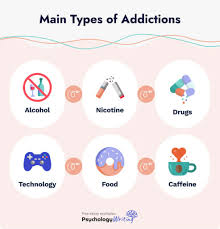The Impact of Addictions on Individuals and Society
Addiction is a complex and chronic disease that affects millions of individuals worldwide, leading to serious consequences for both the person struggling with the addiction and society as a whole. Whether it’s substance abuse, such as drugs or alcohol, or behavioral addictions like gambling or technology dependence, the impact can be devastating.
Effects on Individuals
For individuals battling addiction, the effects can be profound. Addiction can lead to physical health issues, mental health disorders, strained relationships, financial problems, legal troubles, and a decline in overall quality of life. The constant craving for the addictive substance or behavior can consume their thoughts and actions, making it difficult to focus on anything else.
Effects on Society
On a broader scale, addiction has far-reaching effects on society. It contributes to increased healthcare costs, strains social services and criminal justice systems, reduces workplace productivity, and fuels societal stigma and discrimination against those struggling with addiction. The ripple effect of addiction touches families, communities, and economies.
Treatment and Support
While addiction is a serious issue, it is important to remember that recovery is possible with the right treatment and support. Various interventions such as therapy, medication-assisted treatment, support groups like Alcoholics Anonymous or Narcotics Anonymous, and lifestyle changes can help individuals overcome their addictions and lead fulfilling lives.
Prevention Efforts
Prevention plays a crucial role in addressing the issue of addiction. Educating individuals about the risks associated with substance abuse or certain behaviors, promoting healthy coping mechanisms and stress management strategies, fostering strong social connections, and early intervention are key components of prevention efforts.
In Conclusion
Addiction is a complex problem that requires a multi-faceted approach to address effectively. By raising awareness, providing support for those in need, implementing evidence-based treatment options, and working together as a society to reduce stigma and promote understanding, we can make strides in combating addiction’s impact on individuals and society as a whole.
Exploring the Spectrum of Addictions: Key Types and Categories Unveiled
- What are the three main addictions?
- What are the 9 types of addiction?
- What are the 4 areas of addiction?
- What are 5 most common types of addiction?
What are the three main addictions?
Addictions can manifest in various forms, but three main types are commonly recognized: substance addiction, behavioral addiction, and process addiction. Substance addiction involves the dependence on substances such as drugs or alcohol, leading to physical and psychological withdrawal symptoms when use is reduced or stopped. Behavioral addiction refers to compulsive behaviors like gambling or gaming that provide a sense of pleasure or relief but can become uncontrollable and harmful. Process addiction involves addictive behaviors related to activities like eating, shopping, or sex that lead to negative consequences and interfere with daily functioning. Recognizing these main types of addictions is crucial in understanding the diverse nature of addictive behaviors and the importance of seeking appropriate help and support for recovery.
What are the 9 types of addiction?
There are various types of addiction that can impact individuals in different ways. The nine common types include substance addictions such as alcohol, drugs (both prescription and illicit), nicotine, and caffeine. Behavioral addictions encompass gambling, gaming, internet/social media, and shopping. Each type of addiction involves a compulsive need to engage in the addictive behavior or consume the substance despite negative consequences, highlighting the diverse nature of addictive disorders and the importance of seeking appropriate help and support for recovery.
What are the 4 areas of addiction?
Addiction can manifest in various forms and impact different aspects of an individual’s life. The four main areas of addiction typically include substance addiction, such as drugs or alcohol, behavioral addiction, which can encompass activities like gambling or shopping, psychological addiction, involving patterns of thought and emotional dependence, and physical addiction, characterized by the body’s reliance on a substance or behavior to function normally. Understanding these distinct areas of addiction is essential in addressing the complexities of addictive behaviors and providing effective support and treatment for those affected.
What are 5 most common types of addiction?
There are five common types of addiction that individuals may struggle with: substance abuse (including drugs and alcohol), gambling addiction, technology addiction, food addiction, and nicotine addiction. Each of these addictions can have a profound impact on an individual’s physical health, mental well-being, relationships, and overall quality of life. It is important for individuals to seek help and support if they are experiencing any of these addictive behaviors to address the underlying issues and work towards recovery.




